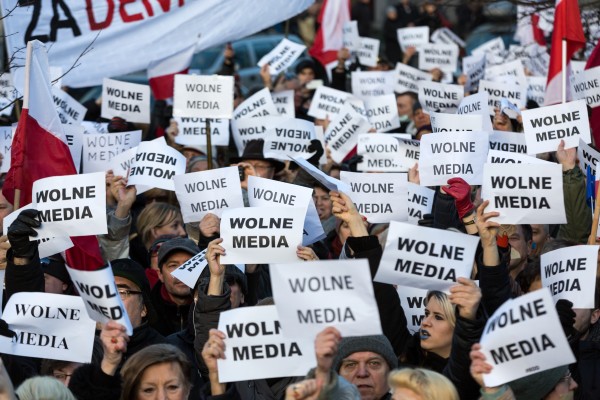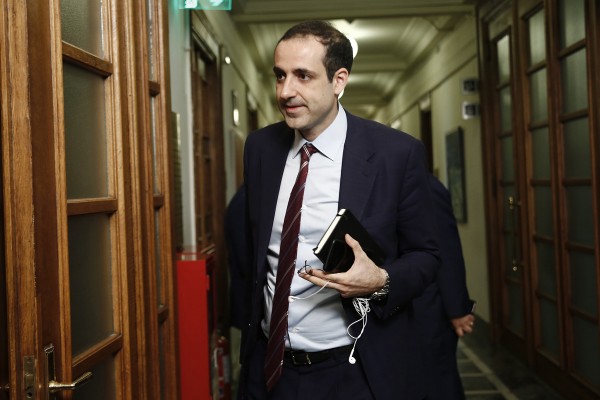Prime Minister Anders Fogh Rasmussen
The Prime Minister’s Office
Christiansborg
Prins Jřrgens Gĺrd 11
1218 Copenhagen K
Denmark
Fax +45 33 11 16 65
Vienna, 30 April 2004
Your Excellency,
The International Press Institute (IPI), the global network of editors, leading journalists and media executives, is dismayed at the decision to bring charges against two Danish journalists.
On 26 April, two journalists from the newspaper Berlingske Tidende, Jesper Larsen and Michael Bjerre, were questioned and subsequently charged with “publishing information illegally obtained by a third party” under Article 152-d of the criminal code. Both journalists face six months’ imprisonment if convicted.
The charges arise from information passed to Larsen and Bjerre by military intelligence officer Frank Soeholm Grevil, who was fired from the Danish Intelligence Services (FE) after breaching the country’s official secrecy act. Grevil apparently passed extracts of intelligence reports to the journalists showing that there was no credible evidence that Iraq possessed weapons of mass destruction before the start of the March 2003 war.
According to Your Excellency’s speeches made in parliament, the existence of weapons of mass destruction was a justification for Danish involvement in the Iraq war. The claims of Grevil, who has also been charged under Article 152-d, appear to throw doubt on these speeches and IPI notes that the Danish defence minister has already resigned over the scandal that ensued after publication of the article in Berlingske Tidende.
While it is impossible for IPI to comment on the validity of the assertions made by the journalists, IPI believes that the story contained a strong “public interest” element that made it vital that the story should be published. The question of what was or was not known about Iraq’s weapons capacity is a matter of crucial debate in many countries around the world and the Danish public have a right to understand and appreciate their own government’s role in this matter.
Moreover, IPI invites Your Excellency to make a distinction between acting in the public interest and acting in the government’s own interest. While IPI accepts that there are some security issues that should be kept secret in the public interest, this should be drawn as narrowly as possible. The public interest should not be used to protect the government’s own interest where it may be embarrassed by the release of information.
IPI also feels that the decision to charge the journalists will only serve to undermine Denmark’s rightful position as one of the freest countries in the world.
IPI notes that on 3 February 2004 Your Excellency said that governments should not bar reporters from writing critically about their policies. Indeed, you commented, “Countries that want to live up to international norms and standards also must be able to endure journalists’ critical light.” You then went on state, “It is fundamental for the development of a sustainable democracy that there is a free access for the media to investigate and possibly to write critically about the countries’ governments.”
While such comments are to be applauded, IPI would remind Your Excellency that it is also for your own government to endure this “critical light.” IPI is of the opinion that comments made about press freedom will only carry their due weight if they are made by countries who are also seen to be observing these standards. The failure to do so will only encourage other countries to ignore them.
According to a table of press freedom rankings, released by Freedom House on 28 April, Denmark is ranked first in the world alongside Iceland and Sweden. Once again, IPI welcomes the report but would ask Your Excellency to ensure that Denmark maintains this position.
Therefore, with the above in mind, and acknowledging the principle that there is a clear separation between the executive and the judiciary in Denmark, IPI calls upon Your Excellency to do everything in your power to ensure that Larsen and Bjerre are not prosecuted.
We would also encourage Your Excellency to review the law under which the journalists were charged to ensure that in the future the media are allowed to scrutinise the government without fear of prosecution. By doing so you will be affirming the right of everyone to “seek, receive and impart information” under Article 19 of the United Nations Universal Declaration of Human Rights.
We thank you for your attention.
Yours sincerely,
Johann P. Fritz
Director


